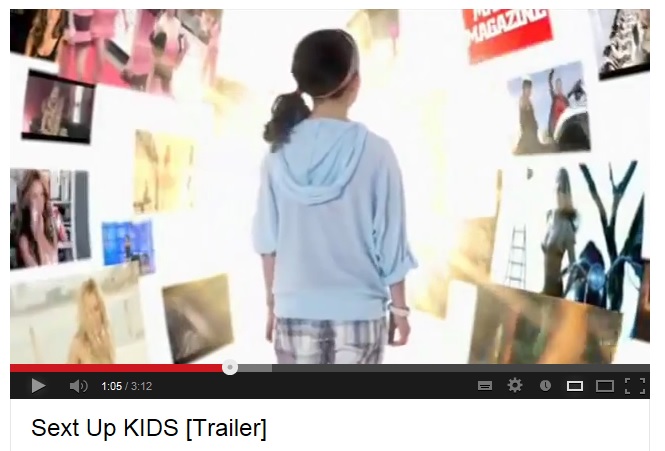This is a very recent documentary from US regarding the sexualisation of children through media and marketing.
The documentary does a good job in making us reflect on the different values pushed on our kids by media, advertising and celebrity culture and it does stress how the reality in which children live today has dramatically changed from even a few years ago: they are constantly bombarded by images and messages, but there is rarely any guidance provided to them regarding how these messages and images are produced and which financial/political/ideological interests are behind certain representations.
The film stresses also the necessity of providing media literacy interventions at an earlier age. We can’t wait for kids to be 12-13: at that point they will have already ingrained into them an incredible amount of messages/images on how to be successful, popular, sexy, beautiful, rich and so on!
The other day I was at a friend’s barbecue and I had the chance of watching with interest one of my friends reproaching (in a very stern way) her own daughter for posing and dancing in a sexually suggesting manner. Being the girl only 5 years old, the scene was actually quite disturbing for many adults to watch and embarrassing to say the least. The girl could not understand in the slightest why reproducing something that she actually seen many times over in TV shows or the internet was a reprehensible thing.
I felt both her pain and the one of her mother!
Only a few years ago adults’ sexual fantasies and imaginary were carefully screened from children view, so we did not have to deal with this sort of problems.
Today everything is on show and children watch with interest, indeed! There is a also a growing emphasis on sex and being sexy in the media, while at home or at school children are discouraged or told off if they express any sexuality or imitate any of the images and behaviours they see so often on TV, the WEB, magazines and so on.
Children are thus living constantly connected, in a constant flow of images and messages which suggest them to be and act in a certain way, but they are expected at the same time from their family, parents and educators to refrain from reproducing the hyper-sexualised nature of these images/messages: what we demand from them is to continue “behaving like a child”, despite the constant pressure surrounding them and the natural, playful, psychologically relevant attitude of children to imitate adult behaviour.
How unrealistic our demand is! To expect from a child to know a priori whether a certain behaviour, action, presentation, performance is right or wrong without providing any guidance and advice regarding the nature of this ever-growing and ubiquitous media content…
…this is not just unrealistic, it is preposterous and unfair.
So let’s watch, reflect and move forwards: let’s give the chance to our children to fully comprehend what’s surrounding them.
Along with many other parents and educators, I am still wondering why media literacy is not becoming central as math or English literacy in the primary school’s curriculum. Despite the MediaSmart initiative being launched a few years ago in UK, there is still a lot to be done in terms of efficacy, involvement and reach: year by year, we watch the “media and marketing machine” becoming ever more sophisticated, putting an ever increasing pressure on our kids, but – at part from the occasional protest or bewilderment – we don’t offer solutions, failing to act urgently on the issue.
Our children are left behind, wondering about this constant carousel of messages and images, gathering important clues from them, probably constructing their own identity, aspirations and fears around them…it is such a disfavour we are inflicting on our society not to act with urgency on this issue.
Back to the documentary. I am including both links: the first link is for the short trailer in You Tube while the second is the movie full length in low resolution (watchable as a demo from the distributor’s website).
Happy (well…probably NOT SO HAPPY…) watching! 🙂

